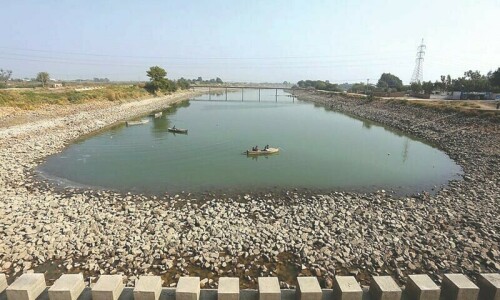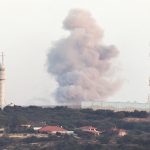• Kharif shortage prediction revised down from 43pc to 27pc as dam levels rise
• Irsa meeting to examine whether water releases to provinces can be increased further
ISLAMABAD: In a godsend development, the water shortage predicted for Kharif season has dropped by almost two-third to 27pc, prompting the Indus River System Authority (Irsa) to increase provincial water shares.
This has brightened hopes in the coming days for better cotton sowing as a 43pc water shortage was earlier feared to dent Kharif crops.
The water regulator is also expected call a meeting of its advisory committee, the second in almost a month, to review latest situation and examine if water discharges to provinces could be further enhanced.
An official said the decision to increase provincial water shares and releases was taken at a meeting of the five-member Irsa, which noted significant improvement in river flows and the water storage situation.
The Irsa advisory committee had earlier resisted provincial pressures, particularly from Sindh for lower allocations and water releases and had given monthly allocations to provinces from the maximum shortage scenario.
As a result, the provinces were given minimum shares, mostly sufficient only for drinking purposes, instead of irrigation. The provinces generally delayed sowing crops where possible, said an official.
Melting snow, rains
In the meanwhile, temperatures in Skardu and adjoining catchment areas increased to 19pc-20pc and river flows improved with snow melting over the past two weeks. The Irsa, however, warned that temperatures were forecast to dip in the coming seven to eight days in view of ongoing rainy spell and result in fewer river flows.
The official said Irsa had released lower shares to provinces than intended, particularly in case of Sindh to ensure balanced supplies once sowing comes into full swing.
The precautionary strategy paid off and shortage dropped by 16 percentage points to 27pc now from 43pc estimated at the start of the season and about 1.3 million acre feet (MAF) of water storage was currently available in major dams as river flows improved, he said.
He said the unpredictable climatic conditions required cautioned approach. In such conditions, it was easier to start with extreme shortage estimate and gradually increase releases in line with the pace of sowing, instead of starting the season with higher discharges and then scale it down at the cost of standing crops.
Provincial shares
Irsa increased Punjab’s releases from 41,000 to 64,800 cusec while Sindh’s share was increased from 35,000 to 45,000 cusec for the next 10 days, ending early next week. Releases to Khyber Pakhtunkhwa and Balochistan remained unchanged at 1,900 and 500 cusec, respectively as they remained exempted from application of cut in their shares.
Officials said the inflows had improved to 52,000 cusec at Tarbela Dam on Sunday against 22,000 cuesec at the time of water allocations by the advisory committee with effect from April 1, the start of Kharif season.
Against these inflows, the outflows had slightly increased from 15,000 cusec on April 1 to about 20,000 cusec at present, building a live storage of about 0.435 MAF as conservation level increased to 1,427 feet from 1,404 feet.
On the other hand, inflows in River Jhelum at Mangla Dam were reported at 42,000 cusec on Sunday when compared to 27,000 cusec early this month. Its outflows were also increased from 15,000 to 25,000 cusec. During this period, the conservation level at Mangla Dam improved to 1,118 feet from 1,074 feet earlier this month, improving the water resource to 0.657 MAF from almost zero.
Total inflows at rim stations was reported at 148,000 cusec on Sunday against 93,000 cusec on April 1 while total outflows were recorded at 99,000 cusec against 73,000 cusec reported earlier. Total live storage was reported at 1.293MAF on Sunday. It was zero at the start of the season.
On March 26, Irsa had forecast an unprecedented water shortage, making it unpredictable to plan water supplies for the entire season. The advisory committee had thus decided to make only ‘drinking supplies’ for the month of April and then review the situation.
The Irsa advisory committee had noted that because of no storage in any of the three storages, water discharges at rim stations stood at 51pc shortage which went beyond 60pc while reaching provincial canal heads.
“The Irsa Advisory Committee duly accounting the unclear climatical parameters and keeping in view the Summer 2025 Weather Outlook presented by Pakistan Meteorological Department, approved the water availability only for the month of April 25 with 43pc system shortfall,” said an official statement issued in the last week of March.
The Met Office had earlier forecast below-normal rain and above normal temperatures especially across Northern and Southern tips of the country for the months of April, May and June and had reported that winter snowfall in the catchments of Indus and Jhelum was recorded as 26.8 inches against the normal of 49.7 inches (i.e., 31pc less), therefore, fewer inflows at the rim station than normal.
Rice, sugarcane, cotton, maize, and mash are some of the key crops of the Kharif season that starts in April and lasts until September.






